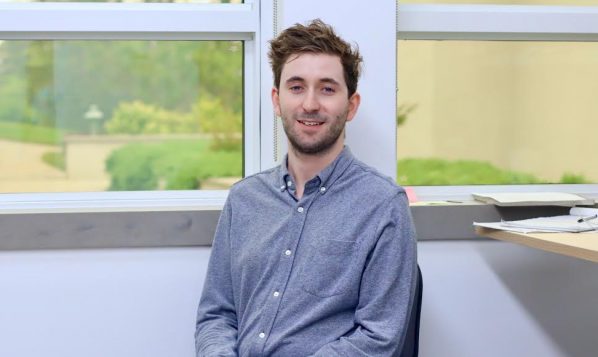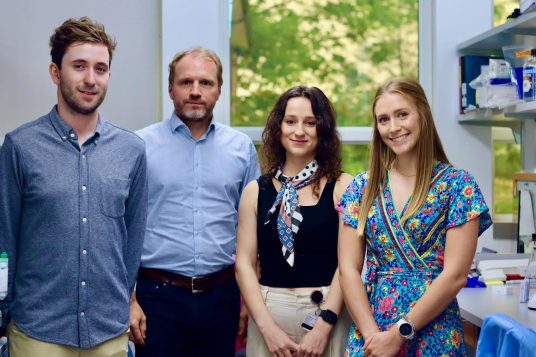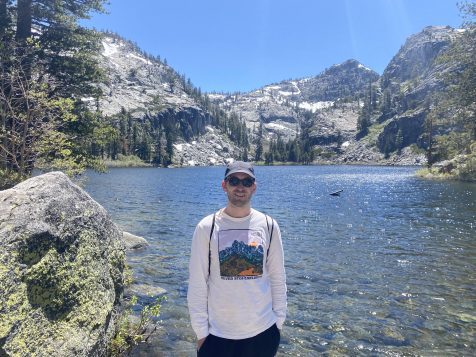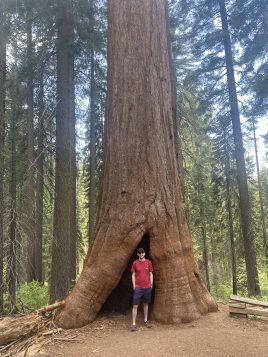Spotlight on CSHL Janowitz Lab with PhD candidate Sam Kleeman
By Daniel Dunaief
This is part 2 of a two-part series.
Cancers not only compromise human health, but they can also suppress the body’s immune response. A little studied small protein called cystatin C, which is secreted by numerous cells, may render the immune system less effective in its response to tumors.
Sam Kleeman, a PhD student in Cold Spring Harbor Laboratory Assistant Professor Tobias Janowitz’s lab, recently published results in the journal Cell Genomics that demonstrate a link between elevated levels of this protease inhibitor, the suppression of the immune system, and the development of cancer.
Kleeman was able to demonstrate a potential role “Cystatin C might play in damping down the immune response to tumors,” he said.
Cystatin C is a known cysteine protease inhibitor, but the biological and organ-level relevance of this has not been characterized in detail. This protein could be one of many mechanisms by which glucocorticoids can reduce the effectiveness of the immune system.
Cystatin C could drive the progression of the disease, which could explain why Kleeman has found evidence that higher levels coordinate with worse outcomes.
Starting with the data
Pursuing an interest in data- driven research, Kleeman, who has a Bachelor of Medicine and Surgery from New College at the University of Oxford, searched the UK Biobank, which provides health data for numerous people in the United Kingdom.
In this Biobank, Kleeman, who joined Cold Spring Harbor Laboratory in August of 2020, found that cystatin C was the best prognostic indicator of cancer deaths.
“I was a little surprised by this,” Kleeman said as he had heard of cystatin C as a marker of kidney function, but was not aware of any association with cancer mortality. Some studies had found evidence for this previously, but those were in small cohorts and were poorly understood, he explained.
A healthy kidney clears most proteins quickly, pumping it out into urine. A kidney that’s not functioning optimally, however, allows it to accumulate.
In his research, Kleeman removed cystatin C selectively in cancer cells, causing the tumors to grow more slowly. The main changes in the architecture of the tumor was that it reduced the frequency of macrophages with expression of a protein called Trem2. While the exact mechanism is not known, it’s likely that immune control of the tumor increases without cystatin C.
Kleeman also demonstrated a similar effect on the connection between levels of Covid-19 and mortality in a paper published in iScience.
The biological mechanism explaining the correlation is nuanced. Patients with higher levels of glucocorticoids can be associated with poor outcomes. It is not a simple relationship, he said, which makes causality difficult to assess.
Kleeman believes cystatin C secretion in response to glucocorticoids has context dependency. Not all cells posses inducible cystatin C secretion.
The research primarily found that only macrophages and cancer cells can secrete cystatin C in response to glucocorticoids.
He describes a “two hit” model, by which glucocorticoids plus an inflammatory stimulus recruit macrophages. The model applies to all inflammatory stores, but is co-opted in the case of cancer.
At this point, drugs aren’t available to inhibit or reduce cystatin C. Instead, Kleeman suggested that a viable research target route might involve creating a specific antibody.
Some researchers have created so-called knockout mice, which don’t have this protein. These mice can survive without it, although eliminating all cystatin C creates other problems.
Kleeman speculated that the protein could play a role in preventing significant immune reaction against sperm.
Indeed, this protein is secreted at high levels in the testes. Males without it have lower sperm function and production.
Kleeman hopes this work acts as a starting point to understand the mechanism better by which glucocorticoids modify immune response to cancer, and to investigate cystatin C as a possible therapeutic target.
Long standing partnership
As an undergraduate, Kleeman took a class with Janowitz, which kicked off a mentorship that now spans two continents.
Kleeman appreciates the comfort level Janowitz has in working on higher-risk, higher-reward topics or on ideas that haven’t already attracted considerable attention from other scientists.
“There’s a tendency in science towards group think,” Kleeman said. In the history of medicine and science, many widely accepted theories turn out to be wrong. “Patients undoubtedly benefit from a diversity of thought in science and medicine,” he explained.
When he completes his PhD, Kleeman said it would be a “dream to have a dual appointment” in which he could conduct research and work in the clinic with patients. To get there, he knows he needs to establish his research profile that includes a genuine track record of achievement while demonstrating that he can function as a reliable and effective clinician.
Kleeman’s thesis research lies outside the field of cystatin C, which started out as a curiosity and developed into the recent publication. He wanted to “understand what UK Biobank could teach us about cancer patients.” With Janowitz and Cold Spring Harbor Laboratory Professor Hiro Furukawa, Kleeman is working to understand how a specific type of cancer could cause an auto-immune disease.
A resident of Forest Hills, Kleeman lives about 45 minutes from the lab. Outside of work, he enjoys visiting national parks. He has visited 10 so far, including Yosemite National Park, Zion and Rocky Mountain National Park.
Professionally, Kleeman feels it is a privilege to be a PhD student. He appreciates that he can explore his interests without too many restrictions and is eager to make the most of the opportunity.










